2025年中考英语语法复习讲义及练习——介 词(无答案)
文档属性
| 名称 | 2025年中考英语语法复习讲义及练习——介 词(无答案) |
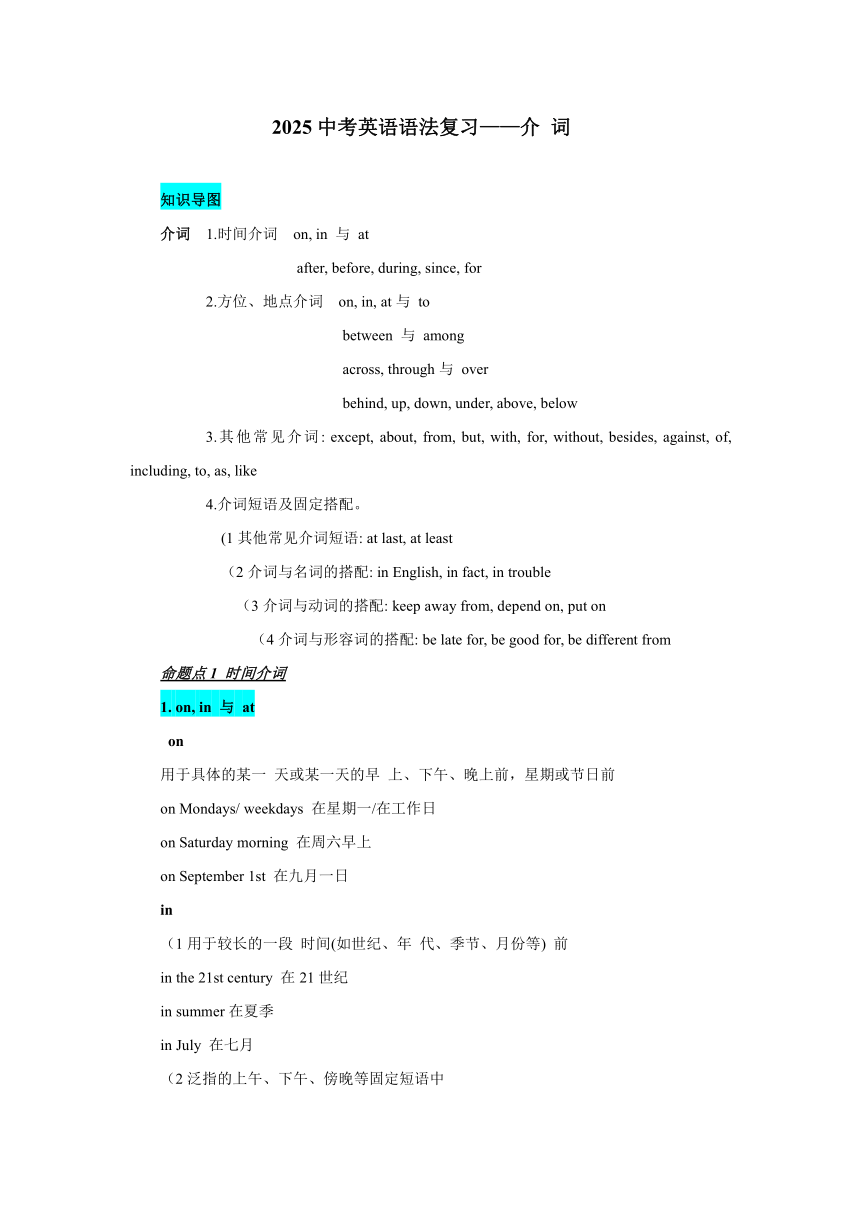
|
|
| 格式 | docx | ||
| 文件大小 | 33.3KB | ||
| 资源类型 | 教案 | ||
| 版本资源 | 人教新目标(Go for it)版 | ||
| 科目 | 英语 | ||
| 更新时间 | 2024-11-14 15:08:08 | ||
图片预览

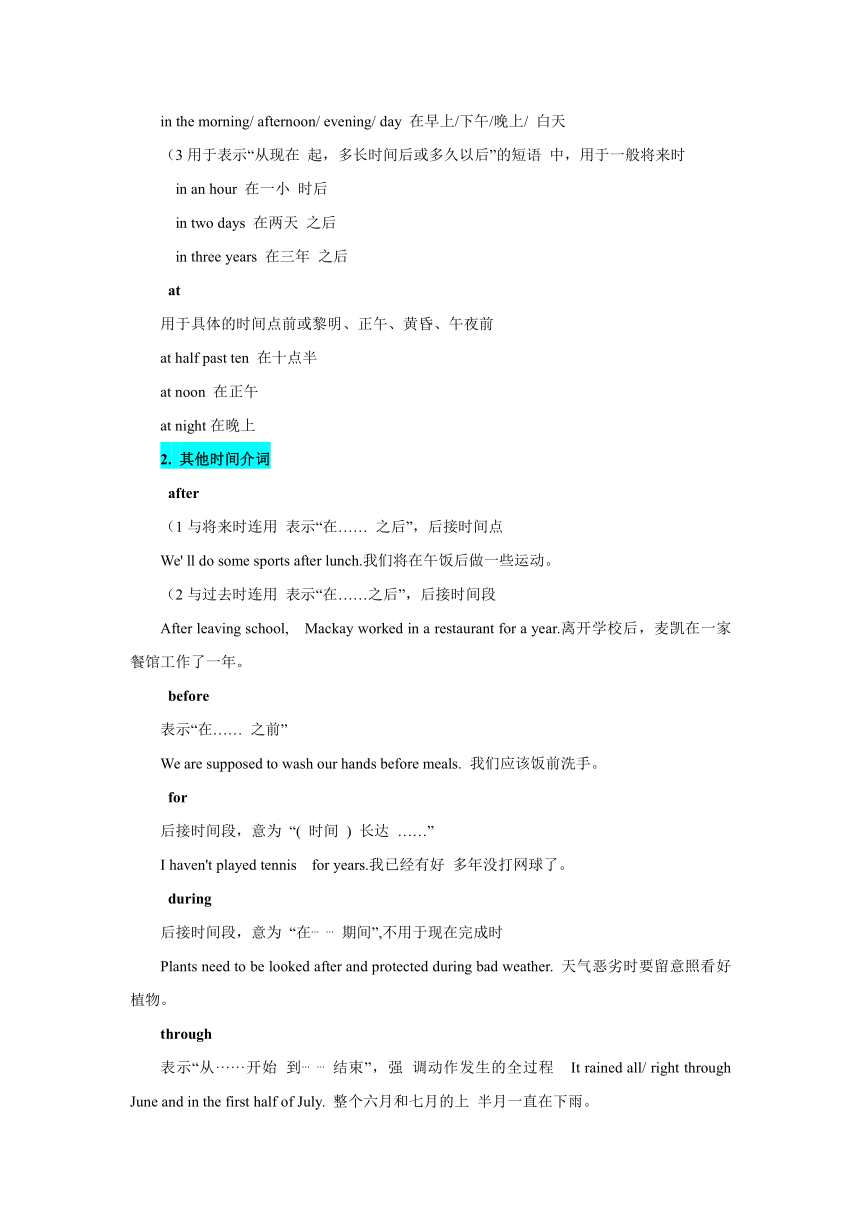
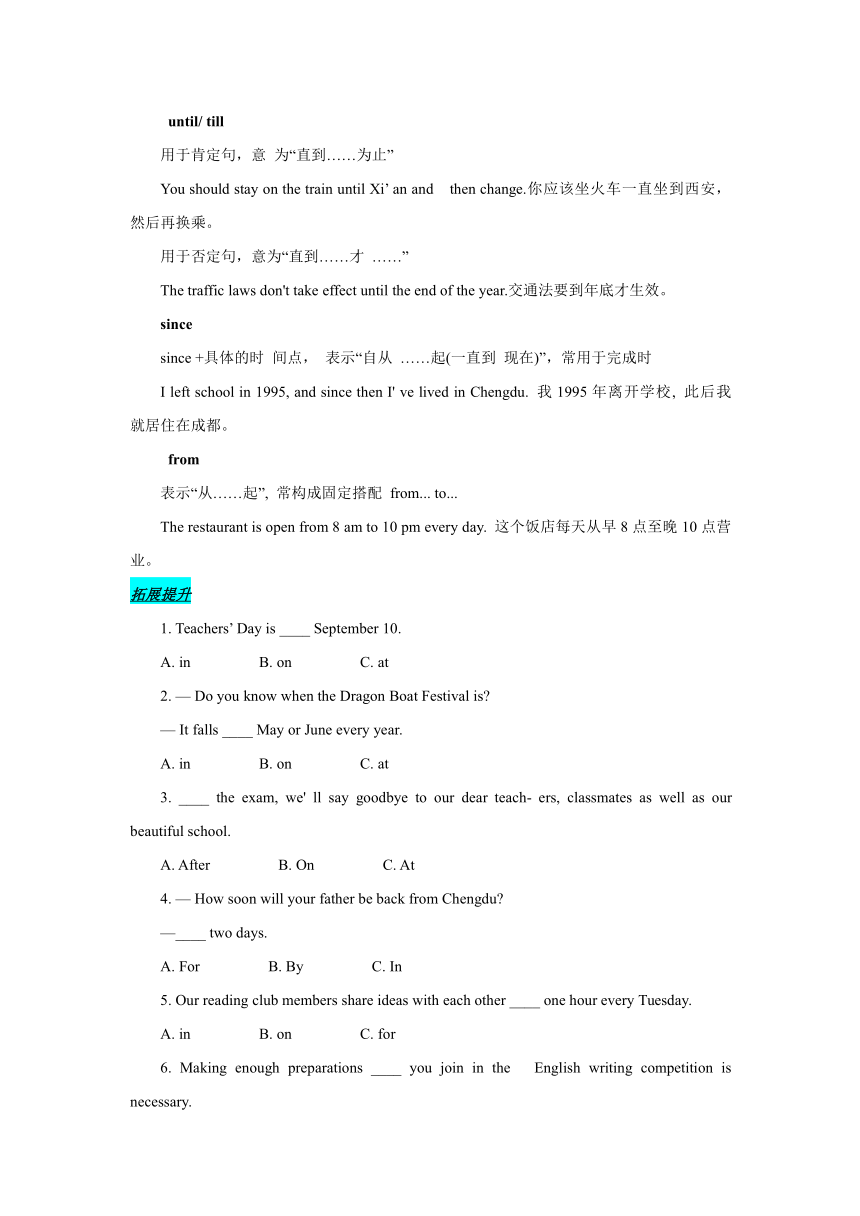
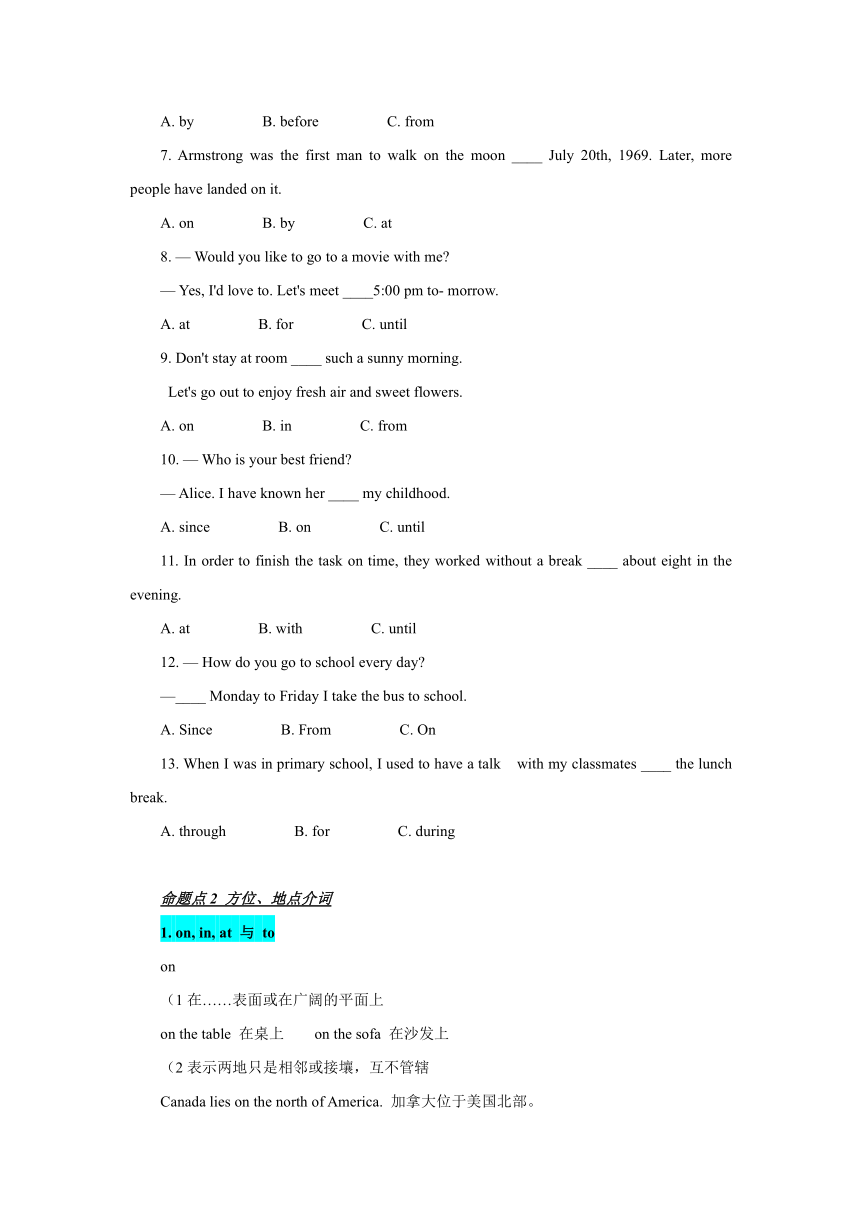
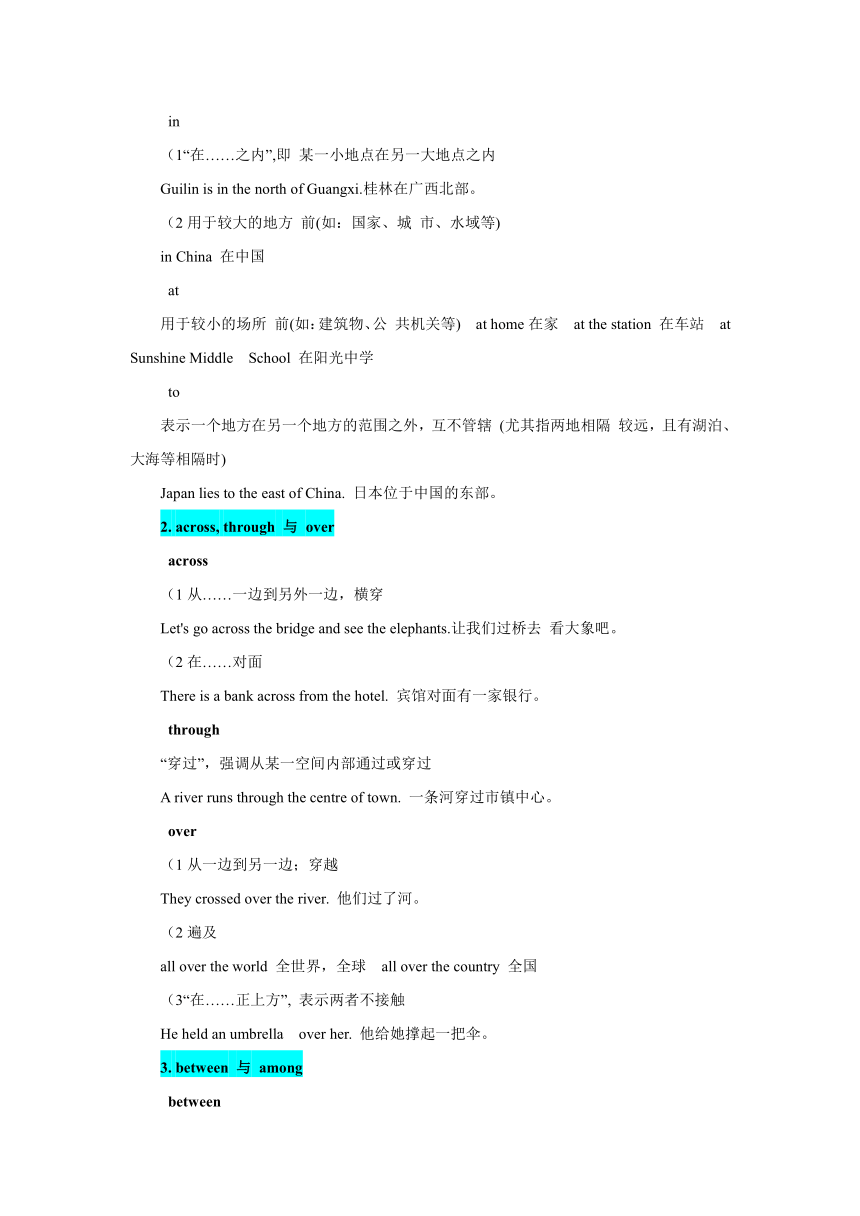
文档简介
2025中考英语语法复习——介 词
知识导图
介词 1.时间介词 on, in 与 at
after, before, during, since, for
2.方位、地点介词 on, in, at与 to
between 与 among
across, through与 over
behind, up, down, under, above, below
3.其他常见介词: except, about, from, but, with, for, without, besides, against, of, including, to, as, like
4.介词短语及固定搭配。
(1其他常见介词短语: at last, at least
(2介词与名词的搭配: in English, in fact, in trouble
(3介词与动词的搭配: keep away from, depend on, put on
(4介词与形容词的搭配: be late for, be good for, be different from
命题点1 时间介词
1. on, in 与 at
on
用于具体的某一 天或某一天的早 上、下午、晚上前,星期或节日前
on Mondays/ weekdays 在星期一/在工作日
on Saturday morning 在周六早上
on September 1st 在九月一日
in
(1用于较长的一段 时间(如世纪、年 代、季节、月份等) 前
in the 21st century 在21世纪
in summer在夏季
in July 在七月
(2泛指的上午、下午、傍晚等固定短语中
in the morning/ afternoon/ evening/ day 在早上/下午/晚上/ 白天
(3用于表示“从现在 起,多长时间后或多久以后”的短语 中,用于一般将来时
in an hour 在一小 时后
in two days 在两天 之后
in three years 在三年 之后
at
用于具体的时间点前或黎明、正午、黄昏、午夜前
at half past ten 在十点半
at noon 在正午
at night在晚上
2. 其他时间介词
after
(1与将来时连用 表示“在…… 之后”,后接时间点
We' ll do some sports after lunch.我们将在午饭后做一些运动。
(2与过去时连用 表示“在……之后”,后接时间段
After leaving school, Mackay worked in a restaurant for a year.离开学校后,麦凯在一家餐馆工作了一年。
before
表示“在…… 之前”
We are supposed to wash our hands before meals. 我们应该饭前洗手。
for
后接时间段,意为 “( 时间 ) 长达 ……”
I haven't played tennis for years.我已经有好 多年没打网球了。
during
后接时间段,意为 “在 期间”,不用于现在完成时
Plants need to be looked after and protected during bad weather. 天气恶劣时要留意照看好植物。
through
表示“从······开始 到 结束”,强 调动作发生的全过程 It rained all/ right through June and in the first half of July. 整个六月和七月的上 半月一直在下雨。
until/ till
用于肯定句,意 为“直到……为止”
You should stay on the train until Xi’ an and then change.你应该坐火车一直坐到西安, 然后再换乘。
用于否定句,意为“直到……才 ……”
The traffic laws don't take effect until the end of the year.交通法要到年底才生效。
since
since +具体的时 间点, 表示“自从 ……起(一直到 现在)”,常用于完成时
I left school in 1995, and since then I' ve lived in Chengdu. 我1995年离开学校, 此后我 就居住在成都。
from
表示“从……起”, 常构成固定搭配 from... to...
The restaurant is open from 8 am to 10 pm every day. 这个饭店每天从早8点至晚10点营业。
拓展提升
1. Teachers’ Day is ____ September 10.
A. in B. on C. at
2. — Do you know when the Dragon Boat Festival is
— It falls ____ May or June every year.
A. in B. on C. at
3. ____ the exam, we' ll say goodbye to our dear teach- ers, classmates as well as our beautiful school.
A. After B. On C. At
4. — How soon will your father be back from Chengdu
—____ two days.
A. For B. By C. In
5. Our reading club members share ideas with each other ____ one hour every Tuesday.
A. in B. on C. for
6. Making enough preparations ____ you join in the English writing competition is necessary.
A. by B. before C. from
7. Armstrong was the first man to walk on the moon ____ July 20th, 1969. Later, more people have landed on it.
A. on B. by C. at
8. — Would you like to go to a movie with me
— Yes, I'd love to. Let's meet ____5:00 pm to- morrow.
A. at B. for C. until
9. Don't stay at room ____ such a sunny morning.
Let's go out to enjoy fresh air and sweet flowers.
A. on B. in C. from
10. — Who is your best friend
— Alice. I have known her ____ my childhood.
A. since B. on C. until
11. In order to finish the task on time, they worked without a break ____ about eight in the evening.
A. at B. with C. until
12. — How do you go to school every day
—____ Monday to Friday I take the bus to school.
A. Since B. From C. On
13. When I was in primary school, I used to have a talk with my classmates ____ the lunch break.
A. through B. for C. during
命题点2 方位、地点介词
1. on, in, at 与 to
on
(1在……表面或在广阔的平面上
on the table 在桌上 on the sofa 在沙发上
(2表示两地只是相邻或接壤,互不管辖
Canada lies on the north of America. 加拿大位于美国北部。
in
(1“在……之内”,即 某一小地点在另一大地点之内
Guilin is in the north of Guangxi.桂林在广西北部。
(2用于较大的地方 前(如:国家、城 市、水域等)
in China 在中国
at
用于较小的场所 前(如:建筑物、公 共机关等) at home在家 at the station 在车站 at Sunshine Middle School 在阳光中学
to
表示一个地方在另一个地方的范围之外,互不管辖 (尤其指两地相隔 较远,且有湖泊、 大海等相隔时)
Japan lies to the east of China. 日本位于中国的东部。
2. across, through 与 over
across
(1从……一边到另外一边,横穿
Let's go across the bridge and see the elephants.让我们过桥去 看大象吧。
(2在……对面
There is a bank across from the hotel. 宾馆对面有一家银行。
through
“穿过”,强调从某一空间内部通过或穿过
A river runs through the centre of town. 一条河穿过市镇中心。
over
(1从一边到另一边;穿越
They crossed over the river. 他们过了河。
(2遍及
all over the world 全世界,全球 all over the country 全国
(3“在……正上方”, 表示两者不接触
He held an umbrella over her. 他给她撑起一把伞。
3. between 与 among
between
在…… 中间,指两者之间。
The pay phone is between the post office and the library.公用电话在邮局和图书馆之间。 among
在……中间,指三者或三者以上之间。
They walked among the crowds in the City Square. 他们行走在城市广场的人群中。
4. 其他常见的方位、地点介词
behind 在……后面
The bus station is across from the bank, behind the hotel. 公交车站在银行对面, 宾馆后面。
up往 上端, 沿 ……往上;向(街道 等)较远处,沿 而去
We walked slowly up the hill. 我们慢慢地爬上山。
down 向下,在……的 下方
Walk down the street. 沿着街道走。
under 在……正下方,表示两者不接触
My cat is lying under the chair. 我的猫正躺在椅子下面。
above 在……的上方,表示两者不接触,不一定垂直
The plane is flying above the clouds. 飞机在云层上飞行。
below 在……的下方,表示两者不接触,不一定垂直
The coat reaches below the knees. 那件大衣盖过了膝盖。
outside 在……外面
outside my house 在我房子外面
inside 在……里面
inside the box 在盒子里面
beside 在……旁边
Come and sit beside me. 过来坐在我旁边。
around 环绕,在周围
around the sun 在太阳周围
near 在……附近
near the bus stop 在公共车站附近
拓展提升
14. I can't see Lucy because she is ____ the tree.
A. in front of B. behind C. next to
15. There is a rose bush and wood land ____ the rail- way.
A. above B. among C. beside
16. We can clearly see Shanghai lies ____ the south of Beijing in the map.
A. to B. in C. at
17. This novel is very popular ____ young people. Have you read it
A. among B. across C. between
18. Mary is flying to France. She will arrive ____ Paris on the morning of July 2.
134A. to B. in C. at
19. Teenagers should be encouraged to go ____ and be close to nature.
A. inside B. beside C. outside
20. When I woke up, I saw the bright sunlight coming into the room ____ the window.
A. through B. across C. past
21. Our teacher tells us that it's dangerous to stand ____ the trees when it is raining.
A. against B. behind C. under
22. — If you are too serious, the people ____ you won't be relaxed and comfortable.
—I agree with you.
A. inside B. around C. next
命题点3 其他常见介词
except
除……之外,强调被排除的部分不包括在内
They all came to the party except Matt. 除马特外, 他们都来了派对。
about
(1关于(某人或某事)
At the museum, I learned a lot about robots.在博物馆,我学到了很多关于 机器人的知识。
(2目的是,为了
The activity is about raising money for poor children. 这项活动是为贫困儿童筹款。
(3大约
Each game lasts for about an hour. 每场比赛约持续一小时。
but
除……之外, but 后的词是仅有或存在的内容, 通常用于 all, every, none, nothing 等词后
The problem is anything but easy. 这个问题一点也不简单。
with
(1和 ……一 起, 与……一起
I'd like to stay with my family. 我喜欢和我的家人待在一起。
(2具有,带有(表 示从属关系)
Mary takes her phone with her wherever she goes. 玛丽无论到哪里都带着她的电话。
(3用,使用(表示 工具、手段等)
You can see it with your own eyes. 你可以亲眼观察它。
against
(1反对;违反 against the law 违法
(2与……比赛
I am in our school team and we are going to play against another school next week. 我是校队的一员, 下周我们将和另一所学校 比赛。
(3紧靠, 倚,碰,撞(表示方向 或位置)
against the wall 靠着墙; against the window 倚着窗
(4以……为背景;衬托
His red clothes stood out clearly against the snow. 他的红衣服在白雪中格外显眼。
without 没有
He found the place without difficulty. 他毫不费 力地找到了这个地方。
by
(1靠近;在…… 旁边 by the window 在窗户旁边
(2 by 用,靠,通过,借助于(表示 方式) by hand 手工; by bus 乘公交
(3不 迟 于, 在 ……之前 I will hand in my book report by tomorrow. 我明天前交读书报告。
for
(1为了,给(表目 的、对象)
This silk scarf is for my mom. 这条丝巾是给我妈妈的。
(2因为,由于 be famous for 因……而著名
(3就……而言; 对……来说
This question is too difficult for him. 这个问题对他来说太难了。
(4表示一段时间 for a long time 很长一段 时间
including 包括,包含
She's won many world competitions, including four gold medals in the Olympics.她赢得了许多世界比赛,包括四枚奥运会金牌。
like
(1像……一样
She was like a princess in a fairy tale. 她就像童话故事里的公主一样。
(2例如,比如
Jane likes many sports, like running and swimming.简喜欢许多运动,如跑步和游泳。
in
用语言、声音、 原材料等 in English 用英语 in a low voice 低声地
拓展提升
23. When I miss my mother, I will talk with her ____ the phone.
A. on B. in C. with
24. Dick decided to lose weight ____ eating less and doing more exercise. I think it's helpful.
A. against B. by C. at
25. I got lots of help ____ my teachers during my jun- ior high school.
A. with B. about C. from
26. Whenever I want to give up, I always remember that my mom told me nothing can be learned ____ hard work.
A. without B. besides C. but
27. I often go to the library ____ my classmates after class to read some interesting books.
A. to B. at C. with
28. Ben was helping his mother when the rain began to beat heavily ____ the windows.
A. against B. across C. around
29. Yesterday our headmaster made a speech ____ en- vironmental protection, and we learned something about recycling of waste.
A. to B. about C. with
30. To my surprise, the price ____ water is much higher than that of milk in some places. (盲填)
31. He has already worked in this factory for 20 years. The boss treats him ____ a family member. (盲填)
命题点4 介词短语及固定搭配
1. 介词与动词的搭配
keep away from 远离;回避
arrive at/ in到达 ask for要求
belong to 属于 care for关心;照顾
depend on 取决于 get to 到达
knock at/ on 敲 laugh at 嘲笑
listen to 听 look at看
look for 寻找 look forward to 期待
pay for支付 put on 穿上;上演
stare at 凝视 turn into变成
turn off关闭 wait for等待
2. 介词与名词的搭配
in English用英语 in fact 事实上
in class 在课堂上 in danger处于危险中
in pain 处于痛苦状态 in peace 处于平静状态
in public 在公共场合 in trouble 处于困境中
on time 准时 on the phone打电话
on sale (廉价)出售 on one’ s way to 在某人去……的路上
the number of ……的数量 to one’ s surprise 令某人惊讶的是
with tears in one's eyes 某人眼含泪水
3. 介词与形容词的搭配
be late for 迟到
be good for 对……有好处
be angry at sth. 为某事生气
be angry with sb. 对某人生气
be busy with 忙于
be different from 与……不同
be full of充满……
be good at 擅长……
be interested in 对……感兴趣
be pleased with sd. 对某人感到满意
be proud of 以……为自豪/骄傲
be responsible for 对……负责
be satisfied with sth.对某事感到满意
be strict with sd.对某人严格要求
be sure of 确信……
be surprised at 对……感到惊奇/诧异
be tired of讨厌/厌倦……
4. 其他常见介词短语
at last 最后 at least 至少
at once 立刻 thanks to 幸亏
across from 在……对面 after all 毕竟;终究
for example 例如 instead of代替,而不是
next to 紧靠着
32. No one can be right all the time. When people make mistakes, we should help them out but not laugh ________ them.
A. in B. of C. at
33. When the expert was giving a talk, the meeting room was very quiet. All of us listened ____ him in silence.
A. to B. in C. with
34. — Hey, Bob. You don't look well. What's the matter
— My mother was ill and I cared ____ her last night. I'm tired now.
A. from B. of C. for
35. — Sally, it's already 10:00 pm. It's time for you to go to bed.
—OK, Dad. I' ll turn ____ the TV right now.
A. on B. down C. off
36. — What are you doing
—I'm looking ____ the kids. They should be back for lunch now.
A. after B. for C. at
37. Don't worry ____ the future. As long as you try your best, you will have a bright future.
A. about B. with C. to
38. — The population of the poor is getting smaller and smaller.
—____ the government, their living conditions have improved.
A. Next to B. Thanks to C. Compare to
39. Turn the information you read into a mind map. ________ , you can remember it well and think of it easily.
A. In this way B. In order to C. All in all
40. Many wild animals are ____ . We'd better do something to protect them.
A. on duty B. on show C. in danger
41. You can't do anything without an aim or a plan. So make a plan ____ , and you will achieve your dream more quickly.
A. at first B. after all C. at last
42. Some people think only those who have a lot ____ can get along well.
A. in pain B. in common C. in peace
43. It takes him ____ an hour to read every day before he goes to bed.
A. in class B. on sale C. at least
of with in
44. To cut down air pollution, we should take the bus or subway instead ____ driving.
45. The parents talked with their son about the problem ____ person. They really hoped they could help him.
知识导图
介词 1.时间介词 on, in 与 at
after, before, during, since, for
2.方位、地点介词 on, in, at与 to
between 与 among
across, through与 over
behind, up, down, under, above, below
3.其他常见介词: except, about, from, but, with, for, without, besides, against, of, including, to, as, like
4.介词短语及固定搭配。
(1其他常见介词短语: at last, at least
(2介词与名词的搭配: in English, in fact, in trouble
(3介词与动词的搭配: keep away from, depend on, put on
(4介词与形容词的搭配: be late for, be good for, be different from
命题点1 时间介词
1. on, in 与 at
on
用于具体的某一 天或某一天的早 上、下午、晚上前,星期或节日前
on Mondays/ weekdays 在星期一/在工作日
on Saturday morning 在周六早上
on September 1st 在九月一日
in
(1用于较长的一段 时间(如世纪、年 代、季节、月份等) 前
in the 21st century 在21世纪
in summer在夏季
in July 在七月
(2泛指的上午、下午、傍晚等固定短语中
in the morning/ afternoon/ evening/ day 在早上/下午/晚上/ 白天
(3用于表示“从现在 起,多长时间后或多久以后”的短语 中,用于一般将来时
in an hour 在一小 时后
in two days 在两天 之后
in three years 在三年 之后
at
用于具体的时间点前或黎明、正午、黄昏、午夜前
at half past ten 在十点半
at noon 在正午
at night在晚上
2. 其他时间介词
after
(1与将来时连用 表示“在…… 之后”,后接时间点
We' ll do some sports after lunch.我们将在午饭后做一些运动。
(2与过去时连用 表示“在……之后”,后接时间段
After leaving school, Mackay worked in a restaurant for a year.离开学校后,麦凯在一家餐馆工作了一年。
before
表示“在…… 之前”
We are supposed to wash our hands before meals. 我们应该饭前洗手。
for
后接时间段,意为 “( 时间 ) 长达 ……”
I haven't played tennis for years.我已经有好 多年没打网球了。
during
后接时间段,意为 “在 期间”,不用于现在完成时
Plants need to be looked after and protected during bad weather. 天气恶劣时要留意照看好植物。
through
表示“从······开始 到 结束”,强 调动作发生的全过程 It rained all/ right through June and in the first half of July. 整个六月和七月的上 半月一直在下雨。
until/ till
用于肯定句,意 为“直到……为止”
You should stay on the train until Xi’ an and then change.你应该坐火车一直坐到西安, 然后再换乘。
用于否定句,意为“直到……才 ……”
The traffic laws don't take effect until the end of the year.交通法要到年底才生效。
since
since +具体的时 间点, 表示“自从 ……起(一直到 现在)”,常用于完成时
I left school in 1995, and since then I' ve lived in Chengdu. 我1995年离开学校, 此后我 就居住在成都。
from
表示“从……起”, 常构成固定搭配 from... to...
The restaurant is open from 8 am to 10 pm every day. 这个饭店每天从早8点至晚10点营业。
拓展提升
1. Teachers’ Day is ____ September 10.
A. in B. on C. at
2. — Do you know when the Dragon Boat Festival is
— It falls ____ May or June every year.
A. in B. on C. at
3. ____ the exam, we' ll say goodbye to our dear teach- ers, classmates as well as our beautiful school.
A. After B. On C. At
4. — How soon will your father be back from Chengdu
—____ two days.
A. For B. By C. In
5. Our reading club members share ideas with each other ____ one hour every Tuesday.
A. in B. on C. for
6. Making enough preparations ____ you join in the English writing competition is necessary.
A. by B. before C. from
7. Armstrong was the first man to walk on the moon ____ July 20th, 1969. Later, more people have landed on it.
A. on B. by C. at
8. — Would you like to go to a movie with me
— Yes, I'd love to. Let's meet ____5:00 pm to- morrow.
A. at B. for C. until
9. Don't stay at room ____ such a sunny morning.
Let's go out to enjoy fresh air and sweet flowers.
A. on B. in C. from
10. — Who is your best friend
— Alice. I have known her ____ my childhood.
A. since B. on C. until
11. In order to finish the task on time, they worked without a break ____ about eight in the evening.
A. at B. with C. until
12. — How do you go to school every day
—____ Monday to Friday I take the bus to school.
A. Since B. From C. On
13. When I was in primary school, I used to have a talk with my classmates ____ the lunch break.
A. through B. for C. during
命题点2 方位、地点介词
1. on, in, at 与 to
on
(1在……表面或在广阔的平面上
on the table 在桌上 on the sofa 在沙发上
(2表示两地只是相邻或接壤,互不管辖
Canada lies on the north of America. 加拿大位于美国北部。
in
(1“在……之内”,即 某一小地点在另一大地点之内
Guilin is in the north of Guangxi.桂林在广西北部。
(2用于较大的地方 前(如:国家、城 市、水域等)
in China 在中国
at
用于较小的场所 前(如:建筑物、公 共机关等) at home在家 at the station 在车站 at Sunshine Middle School 在阳光中学
to
表示一个地方在另一个地方的范围之外,互不管辖 (尤其指两地相隔 较远,且有湖泊、 大海等相隔时)
Japan lies to the east of China. 日本位于中国的东部。
2. across, through 与 over
across
(1从……一边到另外一边,横穿
Let's go across the bridge and see the elephants.让我们过桥去 看大象吧。
(2在……对面
There is a bank across from the hotel. 宾馆对面有一家银行。
through
“穿过”,强调从某一空间内部通过或穿过
A river runs through the centre of town. 一条河穿过市镇中心。
over
(1从一边到另一边;穿越
They crossed over the river. 他们过了河。
(2遍及
all over the world 全世界,全球 all over the country 全国
(3“在……正上方”, 表示两者不接触
He held an umbrella over her. 他给她撑起一把伞。
3. between 与 among
between
在…… 中间,指两者之间。
The pay phone is between the post office and the library.公用电话在邮局和图书馆之间。 among
在……中间,指三者或三者以上之间。
They walked among the crowds in the City Square. 他们行走在城市广场的人群中。
4. 其他常见的方位、地点介词
behind 在……后面
The bus station is across from the bank, behind the hotel. 公交车站在银行对面, 宾馆后面。
up往 上端, 沿 ……往上;向(街道 等)较远处,沿 而去
We walked slowly up the hill. 我们慢慢地爬上山。
down 向下,在……的 下方
Walk down the street. 沿着街道走。
under 在……正下方,表示两者不接触
My cat is lying under the chair. 我的猫正躺在椅子下面。
above 在……的上方,表示两者不接触,不一定垂直
The plane is flying above the clouds. 飞机在云层上飞行。
below 在……的下方,表示两者不接触,不一定垂直
The coat reaches below the knees. 那件大衣盖过了膝盖。
outside 在……外面
outside my house 在我房子外面
inside 在……里面
inside the box 在盒子里面
beside 在……旁边
Come and sit beside me. 过来坐在我旁边。
around 环绕,在周围
around the sun 在太阳周围
near 在……附近
near the bus stop 在公共车站附近
拓展提升
14. I can't see Lucy because she is ____ the tree.
A. in front of B. behind C. next to
15. There is a rose bush and wood land ____ the rail- way.
A. above B. among C. beside
16. We can clearly see Shanghai lies ____ the south of Beijing in the map.
A. to B. in C. at
17. This novel is very popular ____ young people. Have you read it
A. among B. across C. between
18. Mary is flying to France. She will arrive ____ Paris on the morning of July 2.
134A. to B. in C. at
19. Teenagers should be encouraged to go ____ and be close to nature.
A. inside B. beside C. outside
20. When I woke up, I saw the bright sunlight coming into the room ____ the window.
A. through B. across C. past
21. Our teacher tells us that it's dangerous to stand ____ the trees when it is raining.
A. against B. behind C. under
22. — If you are too serious, the people ____ you won't be relaxed and comfortable.
—I agree with you.
A. inside B. around C. next
命题点3 其他常见介词
except
除……之外,强调被排除的部分不包括在内
They all came to the party except Matt. 除马特外, 他们都来了派对。
about
(1关于(某人或某事)
At the museum, I learned a lot about robots.在博物馆,我学到了很多关于 机器人的知识。
(2目的是,为了
The activity is about raising money for poor children. 这项活动是为贫困儿童筹款。
(3大约
Each game lasts for about an hour. 每场比赛约持续一小时。
but
除……之外, but 后的词是仅有或存在的内容, 通常用于 all, every, none, nothing 等词后
The problem is anything but easy. 这个问题一点也不简单。
with
(1和 ……一 起, 与……一起
I'd like to stay with my family. 我喜欢和我的家人待在一起。
(2具有,带有(表 示从属关系)
Mary takes her phone with her wherever she goes. 玛丽无论到哪里都带着她的电话。
(3用,使用(表示 工具、手段等)
You can see it with your own eyes. 你可以亲眼观察它。
against
(1反对;违反 against the law 违法
(2与……比赛
I am in our school team and we are going to play against another school next week. 我是校队的一员, 下周我们将和另一所学校 比赛。
(3紧靠, 倚,碰,撞(表示方向 或位置)
against the wall 靠着墙; against the window 倚着窗
(4以……为背景;衬托
His red clothes stood out clearly against the snow. 他的红衣服在白雪中格外显眼。
without 没有
He found the place without difficulty. 他毫不费 力地找到了这个地方。
by
(1靠近;在…… 旁边 by the window 在窗户旁边
(2 by 用,靠,通过,借助于(表示 方式) by hand 手工; by bus 乘公交
(3不 迟 于, 在 ……之前 I will hand in my book report by tomorrow. 我明天前交读书报告。
for
(1为了,给(表目 的、对象)
This silk scarf is for my mom. 这条丝巾是给我妈妈的。
(2因为,由于 be famous for 因……而著名
(3就……而言; 对……来说
This question is too difficult for him. 这个问题对他来说太难了。
(4表示一段时间 for a long time 很长一段 时间
including 包括,包含
She's won many world competitions, including four gold medals in the Olympics.她赢得了许多世界比赛,包括四枚奥运会金牌。
like
(1像……一样
She was like a princess in a fairy tale. 她就像童话故事里的公主一样。
(2例如,比如
Jane likes many sports, like running and swimming.简喜欢许多运动,如跑步和游泳。
in
用语言、声音、 原材料等 in English 用英语 in a low voice 低声地
拓展提升
23. When I miss my mother, I will talk with her ____ the phone.
A. on B. in C. with
24. Dick decided to lose weight ____ eating less and doing more exercise. I think it's helpful.
A. against B. by C. at
25. I got lots of help ____ my teachers during my jun- ior high school.
A. with B. about C. from
26. Whenever I want to give up, I always remember that my mom told me nothing can be learned ____ hard work.
A. without B. besides C. but
27. I often go to the library ____ my classmates after class to read some interesting books.
A. to B. at C. with
28. Ben was helping his mother when the rain began to beat heavily ____ the windows.
A. against B. across C. around
29. Yesterday our headmaster made a speech ____ en- vironmental protection, and we learned something about recycling of waste.
A. to B. about C. with
30. To my surprise, the price ____ water is much higher than that of milk in some places. (盲填)
31. He has already worked in this factory for 20 years. The boss treats him ____ a family member. (盲填)
命题点4 介词短语及固定搭配
1. 介词与动词的搭配
keep away from 远离;回避
arrive at/ in到达 ask for要求
belong to 属于 care for关心;照顾
depend on 取决于 get to 到达
knock at/ on 敲 laugh at 嘲笑
listen to 听 look at看
look for 寻找 look forward to 期待
pay for支付 put on 穿上;上演
stare at 凝视 turn into变成
turn off关闭 wait for等待
2. 介词与名词的搭配
in English用英语 in fact 事实上
in class 在课堂上 in danger处于危险中
in pain 处于痛苦状态 in peace 处于平静状态
in public 在公共场合 in trouble 处于困境中
on time 准时 on the phone打电话
on sale (廉价)出售 on one’ s way to 在某人去……的路上
the number of ……的数量 to one’ s surprise 令某人惊讶的是
with tears in one's eyes 某人眼含泪水
3. 介词与形容词的搭配
be late for 迟到
be good for 对……有好处
be angry at sth. 为某事生气
be angry with sb. 对某人生气
be busy with 忙于
be different from 与……不同
be full of充满……
be good at 擅长……
be interested in 对……感兴趣
be pleased with sd. 对某人感到满意
be proud of 以……为自豪/骄傲
be responsible for 对……负责
be satisfied with sth.对某事感到满意
be strict with sd.对某人严格要求
be sure of 确信……
be surprised at 对……感到惊奇/诧异
be tired of讨厌/厌倦……
4. 其他常见介词短语
at last 最后 at least 至少
at once 立刻 thanks to 幸亏
across from 在……对面 after all 毕竟;终究
for example 例如 instead of代替,而不是
next to 紧靠着
32. No one can be right all the time. When people make mistakes, we should help them out but not laugh ________ them.
A. in B. of C. at
33. When the expert was giving a talk, the meeting room was very quiet. All of us listened ____ him in silence.
A. to B. in C. with
34. — Hey, Bob. You don't look well. What's the matter
— My mother was ill and I cared ____ her last night. I'm tired now.
A. from B. of C. for
35. — Sally, it's already 10:00 pm. It's time for you to go to bed.
—OK, Dad. I' ll turn ____ the TV right now.
A. on B. down C. off
36. — What are you doing
—I'm looking ____ the kids. They should be back for lunch now.
A. after B. for C. at
37. Don't worry ____ the future. As long as you try your best, you will have a bright future.
A. about B. with C. to
38. — The population of the poor is getting smaller and smaller.
—____ the government, their living conditions have improved.
A. Next to B. Thanks to C. Compare to
39. Turn the information you read into a mind map. ________ , you can remember it well and think of it easily.
A. In this way B. In order to C. All in all
40. Many wild animals are ____ . We'd better do something to protect them.
A. on duty B. on show C. in danger
41. You can't do anything without an aim or a plan. So make a plan ____ , and you will achieve your dream more quickly.
A. at first B. after all C. at last
42. Some people think only those who have a lot ____ can get along well.
A. in pain B. in common C. in peace
43. It takes him ____ an hour to read every day before he goes to bed.
A. in class B. on sale C. at least
of with in
44. To cut down air pollution, we should take the bus or subway instead ____ driving.
45. The parents talked with their son about the problem ____ person. They really hoped they could help him.
